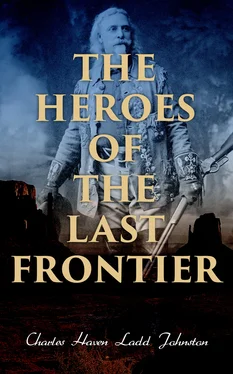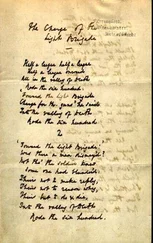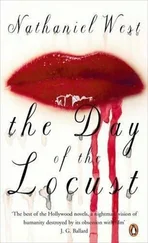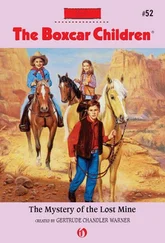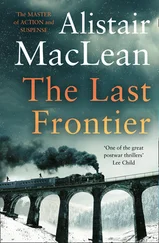Charles Haven Ladd Johnston
The Heroes of the Last Frontier
e-artnow, 2021
Contact: info@e-artnow.org
EAN 4064066384203
THE FRONTIERSMAN
COLONEL BENJAMIN LOGAN:
GEORGE ROGERS CLARKE:
JOHN SLOVER:
LEWIS WETZEL:
SAMUEL COLTER:
MESHACK BROWNING:
“BILL” BENT:
THOMAS EDDIE:
JIM BRIDGER:
“OLD BILL” WILLIAMS:
“BIG FOOT” WALLACE:
CAPTAIN JACK HAYS:
BILL HAMILTON:
UNCLE JOB WITHERSPOON:
HENRY SHANE:
POOR JERRY LANE:
THE SONG OF THE MOOSE
RETROSPECT
Table of Contents
He stood ’neath the whispering pines, by his cabin,
Lanky and gaunt, his face seamed and scarred,
Knotted his hands and blackened with toiling,
Bronzed well his face; his palms rough and hard.
Strangely he gazed in the dim, filmy distance,
Gazed, as the smoke from the fire curled and swayed,
Rapt was his look, for a voice from the forest
Spoke—and in accents disquieting—said:
Come! freeman! come! to the swirl of the river,
Come! where the wild bison ranges and roams,
Come! where the coyote and timber wolves whimper,
Come! where the prairie dogs build their rough homes.
Come to the hills where the blossoms are swaying,
Come to the glades where the elk shrills his cry,
Come—for the wild canyon echoes are saying,
Come—only come—climb my peaks to the sky.
A thrill shook the frame of the woodsman and trapper,
A strange light of yearning came to his eye,
Restless and roving by nature—this wanderer,
Shuddered and paled at the wild, hidden cry;
Trembling he turned towards the hut in the shadow,
Shaking he strode to the low, darkened door,
Then stopped—as sounded the voice from the meadow,
Mutt’ring the challenge—o’er and o’er.
Come, will you come, where the brown ouzel nestles,
Come, where the waterfall dashes and plays,
Come, where the spike-horn rollicks and wrestles,
On a carpet of moss, in the warm Autumn haze;
The cloud banks are blowing o’er Leidy and Glenrock,
On Wessex and Cassa the sun hides its head,
Come, will you come, where the trout leaps in splendor,
Come, only come, let the veldt be your bed.
By the rough, oaken chair lay the grim, shining rifle,
On a nail o’er the fire swung the curled powder-horn,
With a smiling grimace he seized on these weapons,
Wild emblems of conquest—storm-battered and worn.
“Stay,” whirred the loom, as it stood in the shadow,
“Stay,” purred the cat, as it lay near the stove,
“Stay where the woodbine and iris are trailing,
Stay, only stay, calm this spirit to rove.”
But, “come” shrilled the voice on the dim, distant prairie,
“Come, where the Cheyennes are roving and free,
Where the beavers are damming the wild, rushing ice stream,
Where the lean puma snarls in the shaggy, pine tree.
Come—for the call of the wild is resounding,
From Laramie’s peaks rolls the smoke of the fire.
Lighted by scouts, where the herds are abounding,
Fattened and sleek, for the red man’s desire.”
············
Thus came the call, and thus trekked the plainsman,
Westward, yet westward his grim step led on,
By the wide, sedgy steppes, where the Platte curled and whispered,
By the brackish salt lake, stretching gray ’neath the sun,
Where the purple, red flowers in clusters lay glist’ning,
Where the wild kestrel whirled o’er the precipice sheer,
He conquered the wild, while the grizzly stood list’ning,
And growled, as the white canvased wagons drew near.
Table of Contents
THE INTREPID FIGHTER OF THE KENTUCKY FRONTIER
“MOTHER, I know that the law allows me to have all of the property which my father left, but I do not want it. You can have your share, and to my brothers and sisters I give the remainder. I, myself, will move further West, into the wilderness.”
The youth who spoke was about twenty-one years of age; tall, slender, and graceful. His face was open, frank, and expressive. As he ceased, he waved his hand towards the West and left the room in which his parent was sitting upon an old-fashioned horse-hair sofa. His name was Benjamin Logan.
Although the old English law of primogeniture prevailed in Virginia at this time, which gave the farm, horses, and farming utensils to young Logan (upon the death of his father) he refused to accept them. Instead of this, he nobly partitioned the estate between his mother, his three brothers, and two sisters, and removed to the Holston River. Then he began to farm a rough piece of ground, only part of which had been cleared of timber.
About this time the Indians upon the Ohio frontier became very troublesome, and Logan enlisted as a private in the army of Lord Dunmore, Governor of Virginia. Marching into the Indian country was a rough experience, but the youth enjoyed it, and when the red men signed articles of peace at Chillicothe, Ohio, the stout Virginian was among those who stood near the chiefs and saw them put their names to the agreement. Kentucky was now fairly peaceable. So the energetic young man moved his family to Harrodsburg, where a stockade had been erected called Logan’s Fort.
“You must look out for the redskins,” said a comrade to him. “Although they have signed an agreement to let us alone, my friends report that there are many of them in the vicinity, and they are all daubed up with paint, because they are upon the war-path.”
“I will be on my guard,” replied the young pioneer. “We must all run to the fort if there is danger of attack.” The test was to come sooner than he expected.
Upon a balmy day in May, when the women were milking their cows near the gate of Fort Logan, and a few men were standing by, in order to assist them, a small band of redskins appeared at the edge of a thicket. Crash , a volley woke the stillness, and one of the frontiersmen fell dead while two staggered behind the log breastwork, with mortal wounds. A third—a stout fellow called Harrison—was unable to reach the gate, and dragged himself along to the shelter of some bushes.
Within the fort, all gazed with sorrow at the wounded pioneer, who, although in range of the Indian rifles, was so protected that the balls could not quite reach him. Those in the fort kept up a fusillade in the direction of the red men, making them get below cover, and thus the battle continued; the leaden balls zipping and whizzing across the place, where Harrison lay partially concealed. The man’s family, in the fort, seemed to be in an agony of distress at his terrible condition. To save him would require great nerve and heroism. There were but fifteen men in the stockade; two were badly wounded. Should they sacrifice any of this small number in the endeavor to rescue a man, who, even should he be retaken, would be unable to fight in defense of the fortification? This question confronted the beleaguered pioneers, and it was a serious one.
At this moment young Logan stepped forward and said:
“Who will go with me to the rescue of this poor fellow?”
It was strange to see the effect of these words upon the besieged frontiersmen. At first every one refused.
“I’m not a fast runner,” said one, “and know that they will easily catch me on the return trip, even if I am not shot before I reach the wounded man.”
A second—a fellow of giant build—quavered: “I am a weakly chap. I never was no good, nohow, on liftin’. Perhaps you’d better git ernother stouter feller than I be.”
Читать дальше
